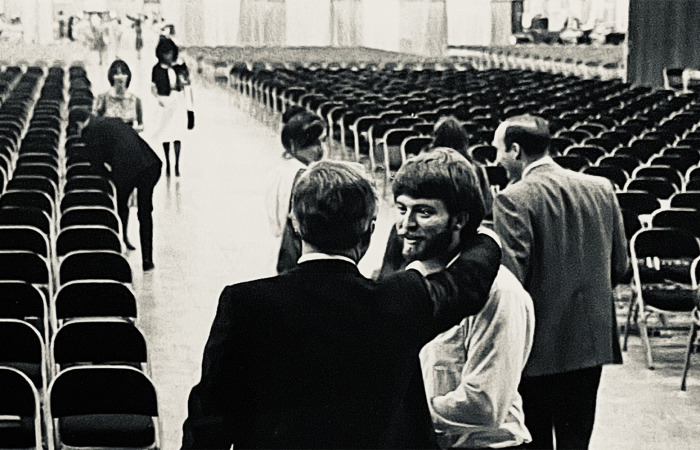“Liberty finds no refuge in a jurisprudence of doubt.” These words opened the Supreme Court’s 1992 Planned Parenthood v. Casey opinion, in which the court sought to clarify, and ultimately settle, the controversy surrounding its landmark abortion-rights decision, Roe v. Wade. However, a brief assessment of the legal state of abortion rights in America reveals that the Court has failed to settle much of anything.
In Roe, the Supreme Court first recognized the right of a woman to terminate her pregnancy. The Court explained there, and in other cases, that the “liberty” protected by the Fourteenth Amendment to the U.S. Constitution includes a “right of personal privacy” and that this right is “broad enough to encompass a woman’s decision whether to terminate her pregnancy.” However, the Court also held that this right is not absolute because the state has legitimate interests in “protecting the potentiality of human life.” To justify its holding, the Court arrived at two critical conclusions. First, the Court asserted that the unborn fetus is not legally a “person” entitled to constitutional protection. Second, the Court determined that viability, or the fetus’s ability to survive outside the womb, was the central balancing point between the woman’s abortion right and the state’s interest in protecting life. So, before fetal viability, a state may not place an “undue burden” on a woman’s right to seek an abortion. After viability, the state may regulate or even ban abortion, except where it is necessary to preserve the life or health of the mother.
Under this undue burden test, the Court has invalidated some abortion restrictions while upholding others. For example, the Court struck down a state law banning abortion except to save the life of the mother, a spousal-notification law, and a law requiring abortion providers to have admitting privileges at a nearby hospital. The Court has sustained a parental-notification law, an informed-consent law, and a law requiring a 24-hour waiting period prior to obtaining an abortion.
Ultimately, however, the recognition of the abortion right and its viability standard are unsound and arbitrary. The Bible teaches the sanctity of human life at all stages, and even affirms this principle specifically in the womb. In Psalm 139:13-14, David reveals the mysteries of God’s handiwork in the inception of life:
For you created my inmost being; you knit me together in my mother’s womb. I praise you because I am fearfully and wonderfully made; your works are wonderful, I know that full well.
God’s Word further clarifies that the unborn child should be treated as a person under Hebrew law:
If men struggle with each other and strike a woman with child so that she gives birth prematurely, yet there is no injury, he shall surely be fined as the woman’s husband may demand of him, and he shall pay as the judges decide. But if there is any further injury, then you shall appoint as a penalty life for life, eye for eye, tooth for tooth, hand for hand, foot for foot, burn for burn, wound for wound, bruise for bruise. — Exodus 21:22–25.
Notice first that this Hebrew law does not vary based on fetal viability. The passage provides blanket protection for the unborn child once its injury is manifest. Additionally, the penalty that Hebrew law prescribes for wounding an unborn child — the “eye-for-an-eye” standard — is the exact same standard Leviticus 24:17–20 prescribes when adults kill or injure each other.
If a man takes the life of any human being, he shall surely be put to death. … If a man injures his neighbor, just as he has done, so it shall be done to him: fracture for fracture, eye for eye, tooth for tooth; just as he has injured a man, so it shall be inflicted on him.
God uses these passages, and others, to affirm that human life is precious at all stages in the womb. And medical technology confirms what the Bible has stated for generations: that the unborn child is a separate human being from the mother. We now know that the fetus has its own DNA, a separate heartbeat, distinct brain waves, and unique fingerprints. The Creator of the universe has declared the humanity of the unborn child, and Roe is inconsistent with His supreme declaration.
Naturally, Roe’s inconsistency with God’s created order has led to patently inconsistent results in the courts. For example, the Supreme Court invalidated a state law banning two “gruesome” late-term abortion procedures, but it upheld a federal law banning only one of those same procedures. Justice Ruth Bader Ginsburg correctly noted that the Court’s reasoning between the two decisions is “irrational.” For if the unborn child is not a person, but merely tissue, then why should our legal system prohibit any particular procedure simply because it is visually unpleasant? On the other hand, if the unborn child is a person, then our legal system should not permit any such late-term abortion procedures because they would constitute torture and infanticide. The unborn child is either a person, or it is not. The Supreme Court cannot have it both ways.
Similarly, this constitutional inconsistency has spilled over into the legislative arena. GOP-led states seeking to protect human life are restricting abortion by passing fetal-heartbeat laws, 20-week abortion bans, and pre-abortion sonogram requirements. Alabama recently passed a law making most abortions illegal, except those where the mother’s life is at serious risk. Democrat-controlled states, however, are aiming to shore up abortion rights by codifying abortion access into state law, repealing abortion restrictions, and permitting abortion up to the moment of birth. Such states are wrestling with Roe’s internally contradictory call for states to permit abortion while simultaneously protecting life.
In the aftermath of Justice Brett Kavanaugh’s confirmation, the calls for the Supreme Court to resolve this abortion debate will only increase in intensity. However, until the Court recognizes the complete personhood of the unborn child at all stages of fetal development — as the Bible does — its abortion jurisprudence will be plagued with paradox.
 Joseph Martins is a professor at Liberty University School of Law. He has lectured extensively on a wide variety of constitutional issues as well as the jurisprudential foundations of law and of America’s legal system. Before entering teaching, Martins practiced public interest law with the Alliance Defending Freedom and the National Legal Foundation, working on cases related to religious liberty, the traditional family, and the sanctity of human life. Several of the cases he litigated yielded published decisions in federal courts around the country.
Joseph Martins is a professor at Liberty University School of Law. He has lectured extensively on a wide variety of constitutional issues as well as the jurisprudential foundations of law and of America’s legal system. Before entering teaching, Martins practiced public interest law with the Alliance Defending Freedom and the National Legal Foundation, working on cases related to religious liberty, the traditional family, and the sanctity of human life. Several of the cases he litigated yielded published decisions in federal courts around the country.




